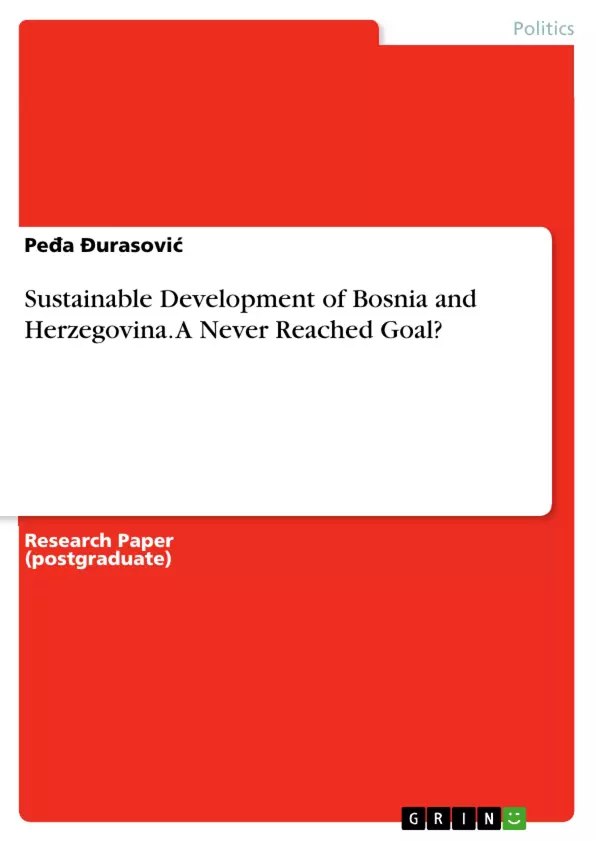This essay views the various development projects and initiatives of Bosnia and Herzegovina concerning their long-term sustainability. Bosnia and Herzegovina is a country which after 23 years of direct involvement of the international community in achieving its sustainable political and economic development still exists as a kind of semi-international protectorate. In addition, Bosnia and Herzegovina's market has never been fully transformed into the western economy concept, where the lack of privatization of the state-owned companies is primarily emphasized. It remains doubtful whether the long-lasting intervention of the international community has delivered the necessary results for any kind of future sustainable development of Bosnia and Herzegovina.
Ever since the war in Bosnia and Herzegovina (1992-1995) ended, and even before that, various development cooperation projects launched by numerous countries and by the international community as a whole have been implemented in Bosnia and Herzegovina. They targeted countless fields of country's structure; from attempts to increase its administrative effectiveness, through initiatives for the much-needed changes within the field of enhancement of political accountability and the country's infrastructure and finally, initiating moves to make the country's market more open and competitive. If we try to assess the impacts of all these development projects and initiatives and their expected long-term sustainability, it seems that most of them failed to make any sustainable effect. Unfortunately, there are no accurate numbers showing the total amounts of funds invested in the reconstruction of Bosnia and Herzegovina, but in accordance to some sources, only the World Bank Mission to Bosnia and Herzegovina from 1996 to 2000 invested 2.7 billion Euro in the reconstruction of the country's basic infrastructure.
Inhaltsverzeichnis (Table of Contents)
- Introductory Considerations
- The Lack of a Well-Structured Reconstruction Approach
- The Lack of a Necessary Active Role of Domestic Authorities
- Human Rights as Nobody's Responsibility
- Conclusion
- Bibliography
Zielsetzung und Themenschwerpunkte (Objectives and Key Themes)
This work aims to assess the effectiveness and long-term sustainability of development cooperation projects implemented in Bosnia and Herzegovina after the war (1992-1995), examining their impact on the country's political, economic, and social spheres. The text critiques the lack of a cohesive international approach and explores the role of both domestic authorities and the international community in achieving sustainable development.
- The impact of international aid projects and assistance on Bosnia and Herzegovina's development.
- The lack of a coordinated and sustainable approach to reconstruction and development.
- The role of domestic authorities in promoting sustainable development.
- The effectiveness of international organizations in delivering aid and achieving long-term results.
- The challenges of political instability and bureaucracy in attracting foreign investments.
Zusammenfassung der Kapitel (Chapter Summaries)
- Introductory Considerations: This chapter provides an overview of the various development cooperation projects implemented in Bosnia and Herzegovina since the war, highlighting the challenges faced in achieving sustainable development. It explores the impact of these projects, analyzing their effectiveness and sustainability, and discusses the role of both international actors and domestic authorities.
- The Lack of a Well-Structured Reconstruction Approach: This chapter analyzes the absence of a coordinated and comprehensive reconstruction strategy, highlighting the lack of collaboration and a shared vision among international actors. It examines the consequences of this fragmented approach on the effectiveness of development assistance and the long-term sustainability of projects.
- The Lack of a Necessary Active Role of Domestic Authorities: This chapter focuses on the role of domestic authorities in promoting sustainable development, highlighting their responsibilities and limitations. It assesses the impact of political instability, corruption, and bureaucratic inefficiencies on the implementation of development projects and the ability of Bosnia and Herzegovina to achieve self-reliance.
- Human Rights as Nobody's Responsibility: This chapter investigates the challenges faced in promoting and protecting human rights in Bosnia and Herzegovina, examining the role of international organizations and domestic institutions. It explores the impact of political divisions and societal tensions on human rights practices and the challenges in achieving lasting peace and reconciliation.
Schlüsselwörter (Keywords)
The key focus of this work lies on the challenges of sustainable development in Bosnia and Herzegovina, highlighting the impact of international aid projects, the role of domestic authorities, and the challenges posed by political instability, bureaucracy, and lack of coordination in the international community. Key terms and concepts explored in the text include: sustainable development, development cooperation, reconstruction, foreign direct investment, political transition, human rights, international aid, accountability, and transparency.
Frequently Asked Questions
Why is Bosnia and Herzegovina described as a "semi-international protectorate"?
Due to the long-term direct involvement of the international community in its political and economic structures following the 1992-1995 war.
What are the main challenges to sustainable development in Bosnia and Herzegovina?
Key challenges include political instability, lack of a well-structured reconstruction approach, corruption, and bureaucratic inefficiencies.
Did international aid projects succeed in the long term?
The essay argues that many international development projects failed to achieve lasting sustainability due to fragmentation and lack of coordination.
What role do domestic authorities play in the country's development?
The lack of an active and responsible role by domestic authorities is cited as a major barrier to achieving economic self-reliance and effective reform.
How much was invested in the reconstruction of infrastructure?
While total figures are hard to track, the World Bank alone invested approximately 2.7 billion Euro in basic infrastructure between 1996 and 2000.
- Arbeit zitieren
- Peđa Đurasović (Autor:in), 2018, Sustainable Development of Bosnia and Herzegovina. A Never Reached Goal?, München, GRIN Verlag, https://www.hausarbeiten.de/document/505436


